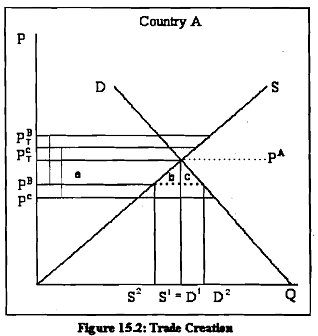Trade Creation:
Trade creation under an FTA implies that imports are sourced from a more efficient producer within the region, at times
involving a shift of imports away from- the rest of the world. Such a shift is welfare increasing in a member country of theFTA. In the above Figure you should be able to see that if country A enters into a FTA with the more efficient suppliercountry C, there will be only trade creation and no diversion. Another example of trade creating effects, where country A forms an FTA with country B, is demonstrated in Figure.

The supply and demand curves for country A are displayed in the figure. The supply prices of the good from countries B and C, respectively, are represented by PB and PC. As assumed earlier, A has a specific tariff tB =tc = t* set on imports fiom both countries B and C. The tariff raises the domestic supply prices to PTB and PTC, respectively. The size of the tariff is denoted by t* = PTB - PB = PTC - PC. Including the tariffs, the pre-FTA price in country A (PA) is less than both PTB and PTC, hence the product will not be imported. Instead country A will meet its domestic demand with its own supply at S1 = D1. If countries A and B form an FTA and A hlly eliminates the tariff on imports from country B, the tB, becomes zero but tC remains at t*. The domestic prices of goods fiom countries B and C become PB and PTc, respectively. Since PB < PA, country A would now import the product from country B after the FTA. At the lower domestic price PB, imports would rise to D2 - S2. It may be noted that trade now is generated in the post-FTA scenario from an efficient source within the region it is called trade creation.
The net welfare effect for the country A can be assessed aggregating the gains and losses to consumers and producers. It has two positive dimensions: a positive production efficiency gain (b) and a positive consumption efficiency gain (c). Thus, an FTA that leads to trade creation implies net welfare gains.
You should be able to show that the gain would be even larger if country A entered into the FTA with the more efficient supplier country C. The analysis of trade creation and trade diversion can also be extended to many markets and multiple countries of an FTA. Therefore, the aggregate effects of an FTA can be obtained by summing up the effects across markets and across countries. Finally, the net welfare effects are measured by taking both trade creation and trade diversion into account. If the positive effects from trade creation outweigh the negative effects from trade diversion, the FTA under consideration is said to be welfare improving.
It is for this reason both trade creation and trade diversion effects need to be combined to assess the welfare-increasing effects of a customs union or RTA.